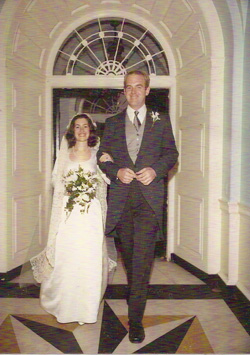Gotham Diary:
Anniversary
3 October 2011
Kathleen and I were married thirty years ago today. It does not seem so very long ago. What it seems is both unimaginably distant (in illo tempore — as I was taught in school: in another kind of time altogether, not quite continuous with ours) and eternally present (marking the beginning of life as I’ve known it). Â
The day is special, but celebration seems out of key. I find it difficult to regard this anniversary in the American way, as marking an achievement. Kathleen and I were lucky to stumble into one another, because it turned out that we were well-suited to stumbling through life together. You think that you know what you’re doing, but the whole point of having brains, it seems, is to grasp, in retrospect, that you didn’t. When we tripped and sometimes fell down, we were able to pick ourselves and, more important, one another up. We dusted ourselves off and kept going. And we were glad, to say the least, of the company.
On Saturday night, we had a dinner party, just six of us, friends whom we’ve known (with one slight exception) since before we were married. I wasn’t thinking of our anniversary when I planned the evening, or prepared the meal, or even when I served it forth. If I was thinking of anything, it was inaugurating a new season, one in which I’m resolved, as I am always resolved, to give more and better dinner parties. In retrospect, though, the evening was the best imaginable observance of our years of marriage. Especially in one novelty: when one of the guests noted that I was having trouble keeping my eyes open, I didn’t protest and open another bottle of champagne; instead, I saw everyone off with a warm “goodnight” and went straight to bed. Â
I can’t say that that wasn’t an achievement.
***
On Friday night, we went to hear Cassandra Wilson and her fantastic band at the Rose Theatre in TimeWarner Center. This was the result of idly chatting about Dianne Reeves while we were out on Fire Island. Kathleen and I are both crazy about Dianne Reeves, and we wondered when she’d be singing in New York? And where? (We’ve heard her at Carnegie Hall and at Grace Rainey Rogers Auditorium — she was fronting for Al Green on the former occasion, but had the Met to herself.) The next thing you know, we’d bought two subscriptions to a series of three Jazz at Lincoln Center concerts, of which the Reeves date is the last, sometime next spring. We have Herbie Hancock before that — neither of us has ever been to hear him, so that will be something. Cassandra Wilson made a believer out of Kathleen when she released In the Belly of the Sun, and we went to see her at the Blue Note a couple of New Year’s Eves ago. Her heading the Hancock-Reeves lineup clearly indicated that subscribing to the series was Meant To Be. I ordered the tickets online from the house. The lagniappe: aisle seats!
We hadn’t been in the Rose yet, and, boy, did we wonder what we’d been waiting for. A gem of a concert hall — any kind of usic would sound good there, I expect — with a great lighting system, the Rose is a great deal more than a shrine to jazz; it’s a place where jazz can grow. And Cassandra Wilson is an artist who makes sure that it will. Her instincts are evenly divided between providing a diva showcase for her luxuriant, low-pitched voice and approaching her material as a jazz deconstructionist. “Her material” happens to be just about anything. It occurred to me to hope that she eventually puts Bach in her hopper. For the moment, her environment doesn’t stretch quite that far, but it comfortably ranges from Gershwin (“the Man I Love”) to Delta (“St James Infirmary”), and is thoroughly infused by Afro-Caribbean rhythms and textures. I mean it as a compliment when I say that Wilson can turn any room into a bordello’s front parlor.
Wilson’s sidemen are all extraordinary, and they do not hide their virtuosity. That’s why I was disappointed when the intermission was erased by the musicians’ spontaneous enthusiasm. A gentleman came out from the wing and handed Wilson a sheet of paper, which she read to the audience: no intermission. All very well in its way, but my ears needed a break, just as they would if the program consisted to two late Beethoven quartets. The result was that we missed the encore(s). When Wilson bid us all “goodnight” and walked off the stage, I told Kathleen that I had to do the same.
Part of the blame goes to Grégoire Maret, the Harlem-Swiss harmonicat who has traded in his Malcolm Gladwell look for a shaved head. It seems unfair, especially to guitarist Marvin Sewell, to single out one member of the band for special mention, but I do so because Maret’s solos, while brilliantly musical, have the urgency of an air-raid siren. They’re electrifyingly acrobatic (as is the musician himself), and you more or less stop breathing for the duration. There’s only so much of this that an elderly body can take. That intermission would have been most welcome!

